Click on a word which is in bold to read what it means.

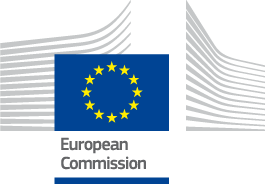
The European Commission has made a campaign
against discrimination at work.
This is important for many people
and also for people with intellectual disabilities.
You can find the campaign here.
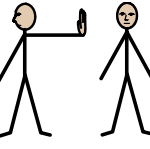
What is discrimination at work?
Discrimination means
that you are treated worse than others
and that you are left out.
Some people are more discriminated against
than others.
For example:
- Women,
- Young or older people,
- People with disabilities,
- People with a different skin colour,
- People of different religion,
- People who are homosexual.
“Homosexual” means a man who has sexual or romantic relationships
with other men
or a woman who has sexual or romantic relationships
with other women.
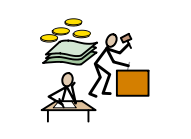
People may face discrimination at work too.
Discrimination at work means
that you are treated unfairly
by your boss or your colleagues.
Colleagues are the people you work with.
For example, discrimination at work is when:
- People with disabilities are not accepted at a job
just because they have a disability. - People lose their job
because their boss or colleagues
found out that they are homosexual. - Women lose their job when they get pregnant
because their boss does not want to give them time off
to give birth and take care of their child. - Young people are not paid enough for their work
just because they are young. - People get less money than others for the same job
just because they are women
or because they have a disability. - People feel bad or left out at work
because their colleagues
make fun of them. - People are not able to get a job
because they have a different skin colour
or a different religion. - People with disabilities do not get the support they need
to be able to work like other people.
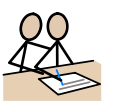
Supporting people with disabilities
to work
In Europe, many people with disabilities
do not have a job.
That’s often because many things are still not accessible.
Then people with disabilities cannot use them.
For example:
- Offices may not be accessible
so people with disabilities cannot work there. - Blind people may not get the technology they need
to help them do their work. - Important information at work may not be easy-to-read
so people with intellectual disabilities
may not be able to understand it.
The European Union thinks
that people with disabilities
should be able to work
like all other people.
They should not be left out
just because they have a disability.
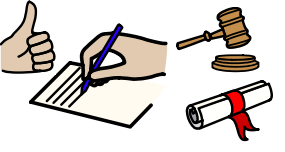
The European Union has made a law
to stop discrimination at work
for people with disabilities.
The law says that people with disabilities
have the right to get the support they need
to work like everyone else.
For example:
- Offices should be accessible
so that people with disabilities
can work there like everyone else. - People with disabilities should be able
to work from home if it is too hard for them
to go to the office every day. - People with disabilities should get technology
that helps them do their job more easily.
It is important that people with disabilities
know their rights at work
and talk about the things they need
with their boss and colleagues.
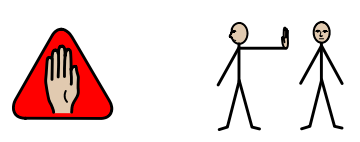
What does the European Union do
to stop discrimination?
The European Union has laws
to protect people from discrimination at work
and other types of discrimination.
For example, the European Union has a law
that says that men and women
should get the same money for the same work.
Women should not get less money than men
just because they are women.
With these laws, the European Union tries to make sure
that all people are treated the same at work.
For example, the European Union tries to make sure that:
- People with disabilities
have the chance to get a job
and be independent. - People are not treated badly
by their boss and other people they work with. - Women have the same chances at work as men.
- Women who become mothers are treated fairly
and get the time they need
to take care of their child.
Sadly, many people in Europe
still face discrimination at work.
This is bad,
and the European Union works to stop it.
No one should be treated unfairly or be left out.
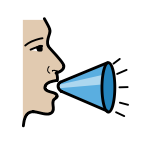
What to do
if you are treated unfairly at work
If you feel that you are treated unfairly at work,
there are many organisations in Europe
that can help you.
They can give you useful information
or even help you say
what you don’t like.
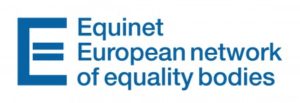
For example, Equinet is an organisation
that works to protect people from discrimination.
On their website, they say
which office in your country
you can contact to get support.
You can also send an email to info@equineteurope.org.
It is important to collect all information and documents
that show that you are discriminated against.
For example, emails with your boss or your colleagues
that show that they don’t treat you well.
With this information,
you can say what’s wrong.
If you cannot find a solution with your boss,
you may go to court.
The court will make a decision
about your case.
If the court decides that you are right
your boss may have to make things better.
You may get money
for the problems you have had to deal with.
Here you can read about Inclusion Europe work on employment for people with intellectual disabilities.
And about non-discrimination.





